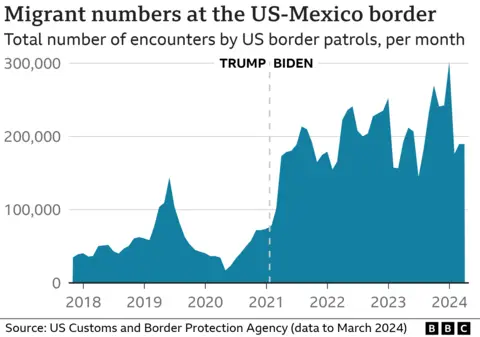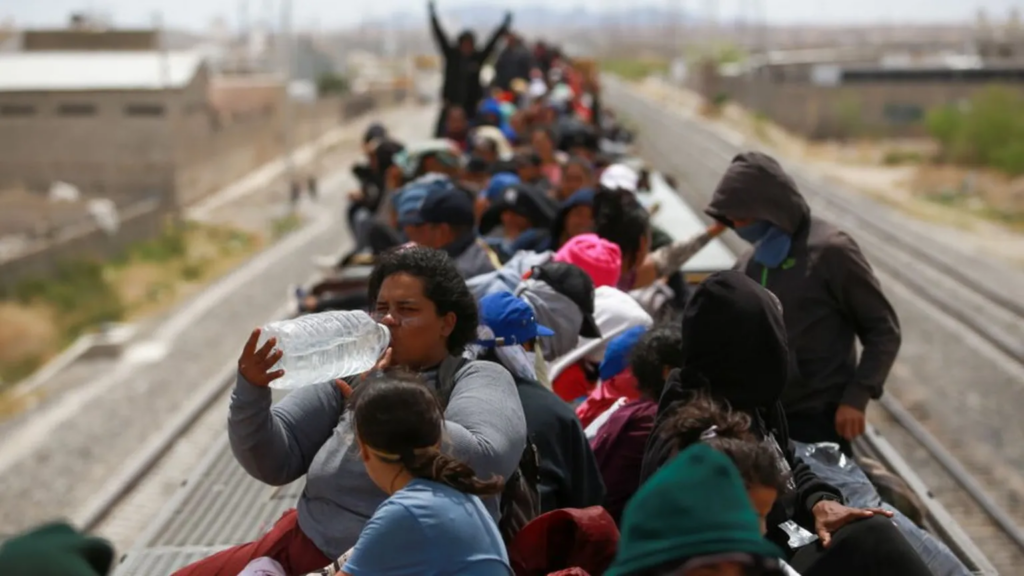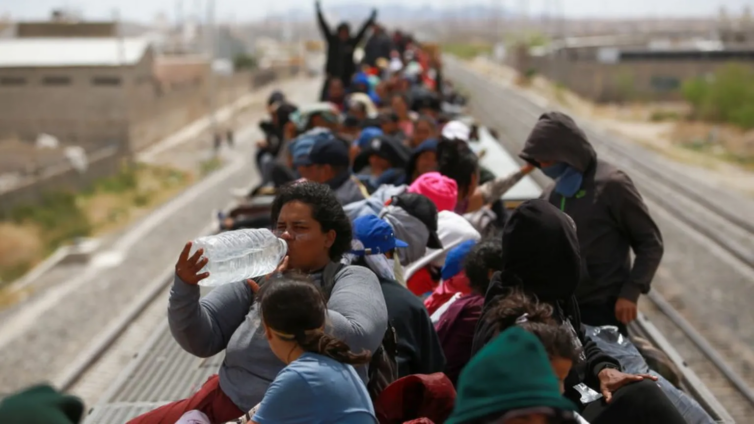
Audio By Carbonatix
Migrant detentions at the US-Mexico border have fallen dramatically in recent months, as a Mexican crackdown stops tens of thousands getting anywhere near a crossing point.
Experts however believe that the reduction is only temporary and ultimately unsustainable.
More than 6.4 million migrants have been stopped crossing into the US illegally during Joe Biden's administration - a record high that has left him politically vulnerable with just six months to go until the US presidential election.
At a news conference earlier this week, Mexican President Andrés Manuel López Obrador said that the number of migrants at the border had fallen by 50%, from a high of 12,000 a day to 6,000 a day four months later.
Separate statistics kept by US Customs and Border Protection (CBP) show that about 177,000 migrants "encounters" were recorded in January, followed by about 189,000 in both February and March.
That is a significant fall from December's 302,000.
CBP figures published on 15 May show that migrant encounters fell even further to 179,000 in April. Of these, 128,000 tried to cross between points of entry unlawfully - a 30% reduction from the same time period in 2023.
Even at this level, however, those figures are still significantly higher than was the case in previous years.

Mr López Obrador credited cooperation between the US and Mexico for the recent decline, along with the increased availability of "legal channels".
But the primary reason, according to experts, is a Mexican crackdown on migrants transiting the country on their way north to the US.
"The only policy change has been Mexico cracking down harder," said Adam Isacson, a migration and border expert from the Washington Office on Latin America.
"Everything else is the same as it was [in December]. There's been no new real announcements, and no changes in deportations.... but it's become harder for them to get to the northern border."
In practice, the crackdown - which followed a December meeting between US Secretary of State Antony Blinken and Mexican officials including Mr López Obrador - has seen Mexican security forces set up new checkpoints on roads, increase patrols, and, in some cases, remove migrants from freight trains headed towards the US border.
Mexican government statistics also show that officials have smashed their own records, with about 120,000 detentions in January and February alone, the last months for which statistics are publicly available.
The vast majority of these migrants have remained inside Mexico, with only limited deportations of about 8,000 people mostly taking place to Guatemala and Honduras.
Instead, large numbers of migrants are moved to Mexico's interior or southern regions.
Lila Abed, the acting director of the Mexico Institute at the Washington DC-based Wilson Center, told the BBC that the status quo was unsustainable and that the reductions are "temporary, rather than permanent."

"The real issue for Mexico is how it's going to be able to attend to this increasing number of migrants and their communities," Ms Abed said, adding that Mexican authorities were "completely overwhelmed".
"Bussing migrants to southern Mexico is not solving the problem, it's just sort of putting a cap on it."
Additionally, Ms Abed said that the root causes of migration to the US - such as insecurity, government instability and economic hardships - have for the most part not changed.
"The root causes that are pushing migrants out of their countries of origin are being aggravated," she said. "That's obviously going to cause a larger flow of migrants towards the United States."
The decline in migrant crossings at the US border comes at a politically fraught time for President Biden. Polls show that immigration is a primary electoral concern for many voters in the run-up to the presidential election in November.

A Gallup poll at the end of April found that 27% of Americans view immigration as the most important issue facing the country, topping the economy and inflation.
A separate poll conducted in March by the Associated Press and NORC Center for Public Affairs Research found that two-thirds of Americans now disapprove of Mr Biden's handling of the border, including about 40% of Democrat voters.
The White House, however, has been largely quiet on the recent drop in migrant arrivals and detentions.
A White House statement in late April said only that Mr Biden and Mr López Obrador had discussed "how to effectively manage" hemispheric migration, adding that both leaders had directed their national security teams to "immediately implement concrete measures to significantly rescue irregular border crossings."
The BBC has reached out to the White House for comment.
Some experts have suggested that the silence is reflective of a White House that is well aware that numbers could begin to climb again - potentially soon.
"I strongly suspect that the administration has finally learned its lesson about declaring victory early. We've seen that in the past, multiple times," said Aaron Reichlin-Melnick, policy director at the American Immigration Council.
"But then after two or three months of lower numbers, they start to creep back up and the administration has to eat crow."
"I also suspect that they are aware that whether or not this is viable remains to be seen, and do not want to draw too much attention to it," he added.
Faced with the possibility of another influx - and the lack of progress passing immigration reforms in Congress - the Biden administration is reportedly mulling a broad executive order that would dramatically limit the number of asylum seekers at the border and essentially shut it down if migrant figures rise above a certain point.
"The question is whether the numbers hold until after the November elections, but if the bubble bursts before November," Mr Isacson said.
"That's when you'd be hearing more rumblings about harsh restrictions...they would probably do that, even if it only meant dropping migration for a few months."
Latest Stories
-
Joy FM’s 90’s Jam is underway at Pleasant Gardens with massive crowds and retro vibes
6 minutes -
Former MMDCEs appeal to President Mahama over delayed end-of-service benefits
1 hour -
TTAG raises alarm over delayed recruitment of trained teachers
2 hours -
Five critically injured after pickup truck rams into vehicles, traders at Bayaard
3 hours -
January 9 declared public holiday
3 hours -
GLICO General petitions Mahama over insurance industry concerns
3 hours -
MDF reiterates commitment to ensure sustainable dev’t in mining communities in 2026
4 hours -
Jospong Group partners Ghanaian scholars in diaspora to drive national development
4 hours -
Newsfile to discuss over $214m loss in Gold-for-Reserves and galamsey fight under Mahama
4 hours -
The Silence of the doer: Why strategic storytelling is the soul of governance
4 hours -
Police nabs 3 drug suspects in Tamale
5 hours -
The surprising benefits of a glass of orange juice
5 hours -
31 remanded over invasion of Apamprama Forest Reserve
5 hours -
One year of President Mahama: Leadership that rebuilt trust – Dr Callistus Mahama writes
5 hours -
Anthony Joshua’s driver charged over Nigeria crash that killed two
5 hours

